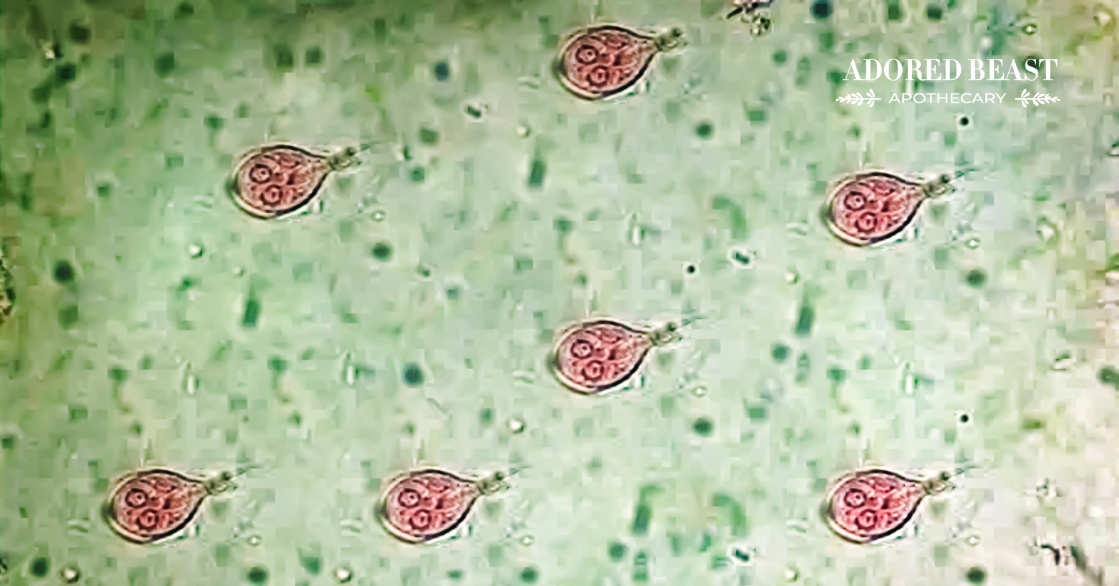If your cat has suddenly developed diarrhea, especially if it’s foul-smelling, greasy, or seems to come and go, giardia could be the culprit. This microscopic parasite is more common than many pet parents realize – and it can make both cats and people sick. Here’s what you need to know about giardia in cats, including symptoms, transmission, treatment, and prevention.
What Is Giardia in Cats?
Giardia is a microscopic protozoan parasite that infects the gastrointestinal tract of animals and people. The specific species that typically affects cats is Giardia duodenalis (also known as G. intestinalis or G. lamblia). Once inside the intestines, the parasite disrupts digestion, leading to unpleasant symptoms, most notably diarrhea.
Giardia has two life stages:
- Trophozoite – the active form that lives in the intestines.
- Cyst – the dormant, infectious form that is shed in the feces and can survive for weeks in the environment.
Not all cats infected with giardia will show signs, but when symptoms do appear, they can include:
- Intermittent or chronic diarrhea (often greasy, pale, and with a strong odor)
- Weight loss
- Lethargy
- Poor coat condition
- Flatulence
- Vomiting (less common)
Kittens and cats with weakened immune systems tend to be more severely affected.
How Do Cats Get Giardia?
Giardia is highly contagious and spreads through the fecal-oral route. Cats become infected by ingesting cysts from:
- Contaminated water (puddles, shared bowls, untreated water)
- Litter boxes (especially in multi-cat homes)
- Grooming themselves after contact with infected feces
- Contaminated surfaces, like bedding or toys
Outdoor cats, cats in shelters or catteries, and those with access to untreated water sources are at higher risk.
[RELATED] What about giardia in dogs? Is it the same approach?
Managing Giardia in Cats
If you suspect giardia, take your cat to the vet. A fecal test (often more than one) is needed for diagnosis, as giardia can be tricky to detect.
Conventional treatment usually includes:
- Antiparasitic medication such as fenbendazole or metronidazole
- Supportive care (hydration, probiotics, and a bland diet if needed)
The thing is, these can be harsh on your kitty’s system, so we always try to go the natural route when we can.
Thankfully, there are lots of things to take from your toolkit to address giardia in cats naturally.
Natural Support Options:
- Dietary Support: Any time a cat has digestive upset we like to suggest going with a bland diet during the acute phase to reduce digestive stress and give it time to relax. This includes boiled chicken, bone broth, and foods rich in fibre, such as plain pumpkin puree, to help firm up stools.
- Probiotics: High-quality probiotics can help restore gut flora and strengthen the digestive system, making it harder for parasites to thrive. They can also protect the immune system!
- Herbal Remedies: Several herbal remedies can be effective to manage the giardia:
- Oregon Grape Root: Known for its antimicrobial properties, this herb can attack parasites and help combat infections. Use a tincture and give 12 drops per 20 pounds of body weight. One important note: we don’t recommend it for catss with liver issues or pregnant or lactating catss.
- Goldenseal: Contains berberine, which may have anti-parasitic effects. Use a dried powder or tincture. For powder, mix 1 teaspoon per 20 pounds of body weight into food. For a tincture, give 5 to 10 drops per 20 pounds of body weight, 2 to 3 times a day.
- Ginger: (dry or fresh). Research shows that ginger helps reduce the number of Giardia trophozoites. Start with a very small amount, such as a tiny piece of fresh ginger or a pinch of powdered ginger, mixed with their food.
- Slippery elm & marshmallow root: These two will help soothe the digestive tract. We recommend our Feline Gut Soothe.
- Immune System Support: Include immune-boosting supplements like medicinal mushrooms or immunoglobulins to enhance your cat’s natural defenses.
- Environmental Management: Regularly sanitize your cat’s living spaces, food bowls, and toys. Use a pet-safe disinfectant to clean surfaces. Bathe your cat on a regular basis to remove any lingering cysts from their coat.
How to Prevent Giardia in Cats
Preventing giardia means focusing on hygiene and environment. Here are some helpful steps:
- 🧽 Keep litter boxes clean, scooping daily and disinfecting weekly.
- 💧 Provide clean, fresh drinking water—use filtered water and clean bowls daily.
- 🧼 Disinfect food and water dishes with hot, soapy water.
- 🧹 Clean floors and surfaces regularly, especially if your cat has had diarrhea.
- 🐾 Bathe or wipe down your cat’s hind end if they’ve had soft stools to prevent re-ingestion of cysts during grooming.
- 🚫 Monitor outdoor time to avoid contaminated water sources.
- 🐱 Isolate infected cats from others during treatment to prevent spreading.
Giardia may be microscopic, but it can cause some major issues for your cat, especially if left untreated. The good news is that with proper care and hygiene, it’s very manageable and often clears up quickly with treatment. If your cat has unexplained diarrhea, especially if it’s ongoing, talk to your vet about testing for giardia. And don’t forget: keeping things clean is your best defense against this pesky parasite.












